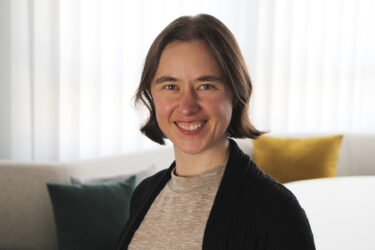Read next
Portrait: Jeanette Miriam Lorenz
“Quantum computing is a bit like looking for the Holy Grail”
Even at a young age, Jeanette Lorenz knew she wanted to go into science. Now she works at Fraunhofer IKS researching how to make reliable and robust quantum computing possible. Part 13 of our employee portraits series.



© iStock.com/Neeraj Verma
As the child of a physicist and a mathematician, Jeanette Lorenz was more or less born to be a scientist. At first, however, her intention was to work in the field of medicine or biology: As a child, she loved roaming through nature with her field guides and was always fascinated by classifying plants and animals into species. Her passion for physics developed later. She describes physics as much more fundamental than biology: “If we really want to understand how nature is actually structured, we need to look to physics.”
The next logical step was to study physics and mathematics: Jeanette studied at the Ludwig Maximilian University in Munich (LMU München), then went on to complete her doctorate and postdoctoral learning qualification. From atomic physics she moved on to particle physics and quantum field theory, and finally to quantum computing.
Her studies were followed by several years of experience researching experimental high-energy particle physics at CERN (the European Organization for Nuclear Research) and working as a Junior Research Group Leader at LMU. As an associate professor there, she also works and teaches at the Faculty of Physics.
The decision to embark on a new chapter in her career came when she completed her postdoctoral lecturing qualification: “After that, I asked myself what I wanted to do and where I wanted to go next to find my purpose in life, so to speak.” Jeanette decided to focus her research on data science, but doing that in particle physics would not have been possible at the time, at least not in Germany.

© Fraunhofer IKS
Jeanette Lorenz: "The path to Fraunhofer IKS has proven to be a lucky coincidence for me".
But since 2020, Fraunhofer IKS has offered quantum computing as a new research area. This option was a stroke of good fortune for Jeanette, and to some extent represents a return to her roots, as she is now once again working at the interface between physics and mathematics. The goal of her work is to make reliable and robust quantum computing easily accessible.
Quantum computing has the potential to effect huge change in many different industries. Currently, however, a lot of research is still needed before it can be applied more broadly. That is what Jeanette finds exciting about the work, because it gives her the chance to shape and craft this very new and active field through her own ideas. She has always enjoyed using new technologies and methods to work on complex problems: “We can be truly innovative here, while bringing together knowledge from a range of very different fields such as computer science, physics, mathematics and statistics.” This has resulted in a wide variety of diverse projects. This interdisciplinary way of working is what she really appreciates about Fraunhofer IKS. She enjoys her work the most when her own idea works really well, just as she imagined it in theory.

Meet our employees
Would you like to learn more about your colleagues at Fraunhofer IKS? Then take a look at the other portraits.
Still a lot of work to be done for equal opportunities in Germany
As well as all these great aspects of a career in research, however, there is also a crucial point that has unfortunately not improved much in recent years: In her advanced physics course at school, Jeanette was the only girl. That was a pattern that would go on to repeat itself. “I never paid much attention to it myself until people started asking me stupid questions during my studies and seemed surprised that I was studying physics.”
As Women’s Officer at the Faculty of Physics at LMU, she gained numerous insights into why many talented women decided not to pursue a career in research. One important reason was that, “In Germany, combining career and family is a much lower priority than in other countries.” There is a very clear need for action in that respect, Jeanette says.
Taking a break in nature
Jeanette’s love of nature still very much informs how she spends her leisure time. As a passionate hiker, she can often be found in the Alps on weekends: “It’s the perfect balance for me; I can be completely grounded and focus on the absolute basics. I’m exposed to the weather and have totally different problems to overcome. In some ways, it’s the complete opposite of work.”


